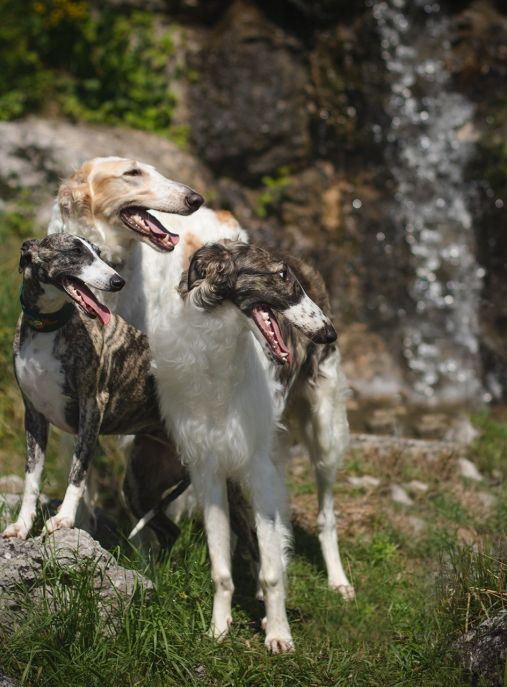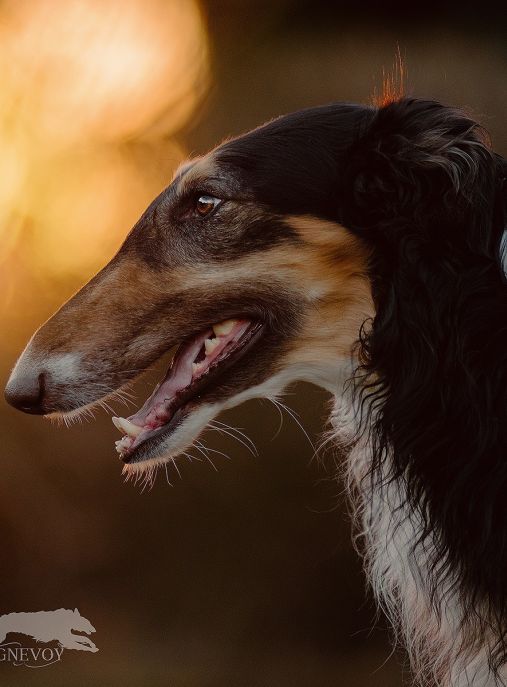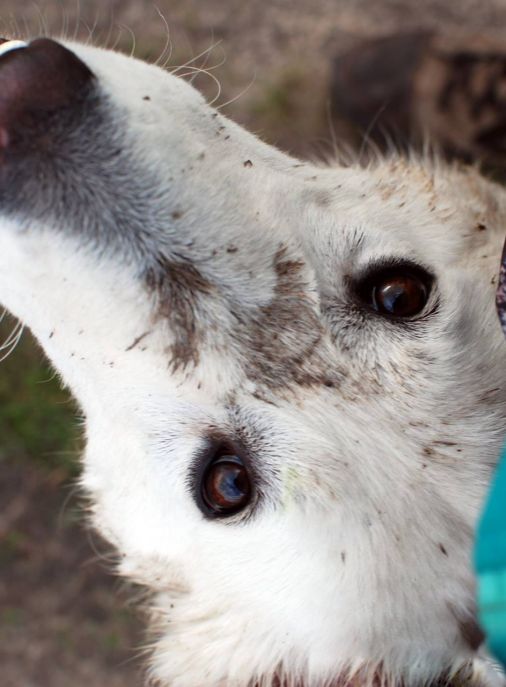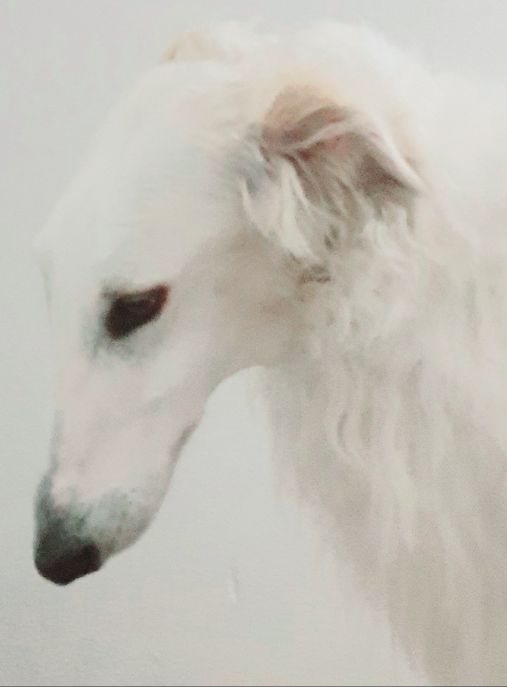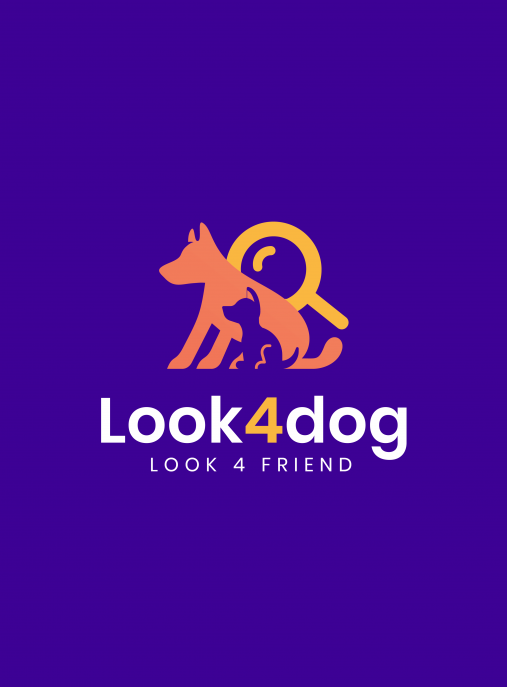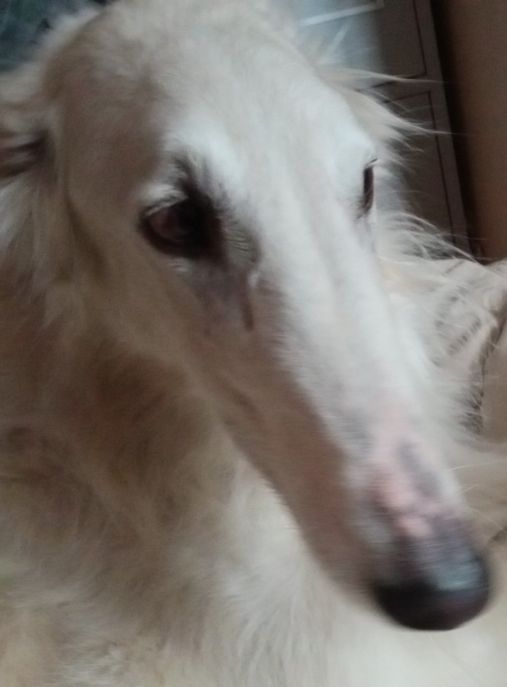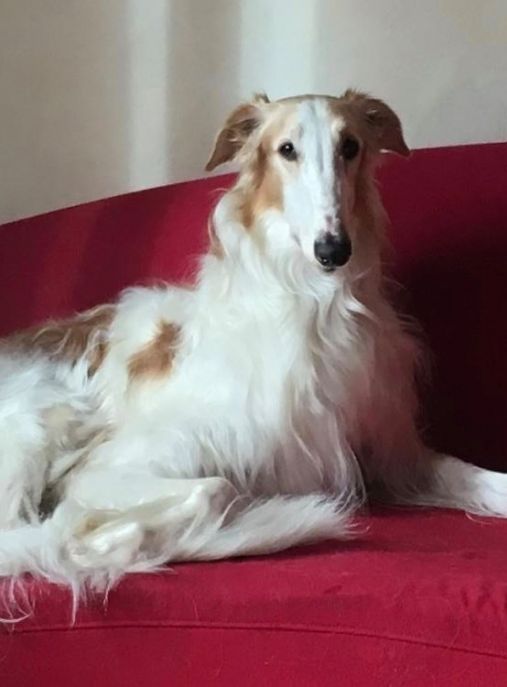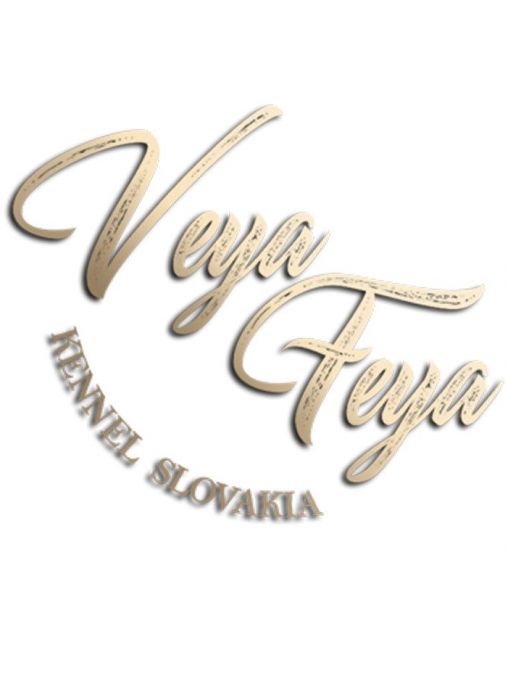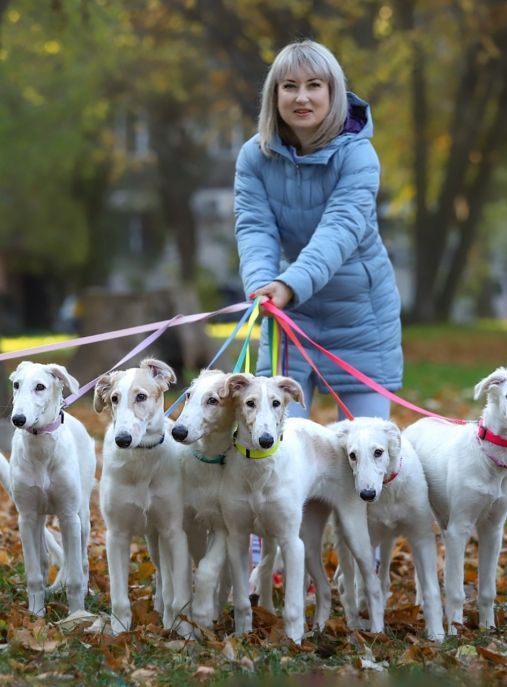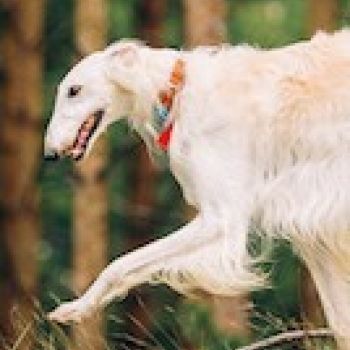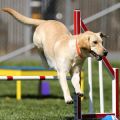The Russian Hunting Sighthound, also known as the Borzoi, is a majestic and elegant dog breed that has been cherished for centuries for its grace, agility, and hunting prowess. With its long, silky coat, slender build, and regal appearance, the Borzoi is often referred to as the "aristocrat" of the dog world.
Originating in Russia, the history of the Borzoi can be traced back to the 13th century when it was primarily used by Russian nobility for hunting wolves, foxes, and other game. These dogs were highly valued for their exceptional speed, keen eyesight, and ability to cover vast distances effortlessly. The breed's name "Borzoi" is derived from the Russian word "borzii," which means "swift."
According to the Fédération Cynologique Internationale (FCI) typology, the Borzoi belongs to Group 10: Sighthounds. This group includes other sighthound breeds such as the Greyhound, Afghan Hound, Saluki, and Irish Wolfhound. Sighthounds are known for their exceptional speed and sight, which allows them to pursue and capture prey with remarkable efficiency.
The Borzoi is primarily a hunting dog, bred for its ability to chase down and capture game. However, over time, it has also become a beloved companion and show dog due to its gentle and affectionate nature. Despite its hunting background, the Borzoi is known for its calm and gentle temperament, making it an excellent family pet.
In terms of physical characteristics, the Borzoi is a large breed with males typically weighing between 75-105 pounds (34-48 kg) and standing at a height of 28-32 inches (71-81 cm) at the shoulder. Females are slightly smaller, weighing between 60-85 pounds (27-39 kg) and standing at a height of 26-30 inches (66-76 cm). The breed has a long, narrow head with a slightly arched skull, almond-shaped eyes, and small, folded ears. Its most distinctive feature is its long, silky coat, which comes in a variety of colors including white, cream, tan, gray, and black.
The Borzoi has a relatively long lifespan compared to other large breeds, with an average life expectancy of 10-12 years. However, with proper care, some Borzoi have been known to live well into their teens. Regular exercise is essential for this breed to keep them physically and mentally stimulated. While they have a strong prey drive, they are generally well-behaved and can adapt well to apartment living as long as they receive sufficient exercise.
One interesting fact about the Borzoi is its unique running style known as "double suspension gallop." This gait allows the breed to cover great distances with minimal effort, making it an exceptional hunter. Additionally, the Borzoi has a gentle and sensitive nature, often displaying a deep bond with its family members.
In conclusion, the Russian Hunting Sighthound, or Borzoi, is a remarkable breed with a rich history and exceptional hunting abilities. With its elegant appearance, gentle temperament, and impressive athleticism, the Borzoi continues to captivate dog enthusiasts around the world. Whether as a hunting companion, show dog, or beloved family pet, the Borzoi's grace and beauty are truly unparalleled.
The Russian Hunting Sighthound, also known as the Borzoi, is a majestic and elegant breed that possesses a unique character. These dogs are known for their grace, intelligence, and gentle nature. With their regal appearance and gentle disposition, they make excellent companions and loyal family pets.
One of the defining characteristics of the Borzoi's character is their calm and reserved demeanor. They are typically quiet and well-mannered, rarely barking unnecessarily. This makes them well-suited for apartment living, as they are not prone to excessive noise. However, it is important to note that they are sensitive dogs and can become anxious or stressed in chaotic or loud environments.
Borzois are known for their independent nature. While they are affectionate and loving towards their families, they also possess a strong sense of independence. This means that they may not always be as eager to please as some other breeds. They are intelligent dogs, but they can be stubborn at times, requiring a patient and consistent approach to training.
These sighthounds have a strong prey drive, which stems from their hunting background. It is important to note that they have a natural instinct to chase small animals, such as squirrels or rabbits. Therefore, it is crucial to keep them on a leash or in a securely fenced area when outside. Early socialization and training can help to minimize this instinct, but it is always important to be cautious.
When it comes to raising and training a Borzoi, it is essential to establish clear boundaries and consistent rules from an early age. Positive reinforcement methods work best with this breed, as they respond well to praise and rewards. Harsh training methods or punishment can lead to fear or anxiety in these sensitive dogs.
Borzois are generally good with children and can be gentle and patient with them. However, due to their large size, supervision is necessary to prevent accidental knocks or falls. They can also be reserved with strangers, but early socialization can help them become more comfortable in new situations.
Exercise is crucial for the physical and mental well-being of a Borzoi. While they have a reputation for being couch potatoes, they still require regular exercise to prevent boredom and destructive behavior. Daily walks, playtime, and opportunities to run in a secure area are essential for their overall health.
Grooming a Borzoi requires regular attention. Their long, silky coats need to be brushed at least once a week to prevent matting and keep them looking their best. They are generally clean dogs and do not have a strong odor, but regular bathing is still necessary to keep their coats and skin healthy.
In conclusion, the Russian Hunting Sighthound, or Borzoi, is a breed with a unique character. They are calm, independent, and possess a strong prey drive. With proper training, socialization, and exercise, they can make wonderful companions. However, they require a patient and consistent approach to training and a secure environment to prevent them from chasing small animals. With their regal appearance and gentle nature, the Borzoi is a breed that captures the hearts of many dog lovers.
The Russian Hunting Sighthound, also known as the Borzoi, is a majestic and elegant breed that requires specific care to ensure their well-being and happiness. These dogs have a unique set of needs, and understanding how to properly care for them is essential for their overall health. Here are some tips on how to care for Russian Hunting Sighthounds:
1. Exercise: Borzois are active dogs that require regular exercise to maintain their physical and mental health. They have a strong prey drive, so it's important to provide them with a secure, fenced-in area where they can run freely. Daily walks or jogs are also necessary to keep them fit. However, be cautious not to overexert them, especially during hot weather, as they are prone to heat exhaustion.
2. Grooming: The Borzoi's coat is long, silky, and requires regular grooming to keep it in good condition. Brushing their coat at least once a week helps prevent matting and keeps their fur clean and shiny. Pay extra attention to their feathering on the legs, tail, and ears, as these areas are more prone to tangles. Regular bathing is also necessary to keep their coat and skin healthy.
3. Feeding: Providing a well-balanced diet is crucial for the overall health of your Borzoi. High-quality dog food that meets their nutritional needs is recommended. However, be cautious not to overfeed them, as they are prone to obesity. Consult with your veterinarian to determine the appropriate portion sizes and feeding schedule for your dog's age, size, and activity level.
4. Socialization: Borzois are known for their gentle and affectionate nature, but they can be reserved around strangers. Early socialization is essential to ensure they grow up to be well-rounded and friendly dogs. Expose them to various people, animals, and environments from a young age to help them develop good social skills and prevent any potential behavioral issues.
5. Training: Borzois are intelligent dogs but can be independent and stubborn at times. Consistent and positive reinforcement training methods work best for this breed. Use rewards, such as treats or praise, to motivate and encourage them during training sessions. Early obedience training is crucial to establish boundaries and prevent any unwanted behaviors.
6. Health care: Regular veterinary check-ups are essential to monitor your Borzoi's health and catch any potential issues early on. Vaccinations, parasite prevention, and dental care should be part of their routine healthcare. Additionally, be aware of specific health concerns that can affect this breed, such as bloat, heart issues, and hip dysplasia. Regular exercise, a balanced diet, and maintaining a healthy weight can help prevent some of these conditions.
7. Safety precautions: Borzois have a strong prey drive and are prone to chasing small animals. It's crucial to keep them on a leash or in a securely fenced area to prevent them from running off or getting into dangerous situations. Additionally, be cautious when introducing them to smaller pets, as their hunting instincts may kick in.
What not to do:
1. Do not leave your Borzoi alone for extended periods. They are social dogs that thrive on human companionship and can develop separation anxiety if left alone for too long.
2. Do not engage in intense exercise or agility training until your Borzoi is fully grown. Their bones and joints are still developing, and excessive strain can lead to long-term health issues.
3. Do not use harsh training methods or punishment. Borzois respond best to positive reinforcement and gentle guidance.
4. Do not overfeed your Borzoi or provide them with a diet high in fat. Obesity can lead to various health problems, including joint issues and heart disease.
5. Do not neglect their dental care. Regular teeth brushing and dental check-ups are essential to prevent dental diseases.
In conclusion, caring for a Russian Hunting Sighthound (Borzoi) requires a commitment to their specific needs. Providing regular exercise, grooming, proper nutrition, socialization, and healthcare are essential for their well-being. By following these tips and avoiding common mistakes, you can ensure that your Borzoi lives a happy and healthy life.
The Russian Hunting Sighthound, commonly known as the Borzoi, is a majestic and elegant breed that possesses a wide range of coat colors. However, one of the most common and striking colors found in these dogs is a beautiful shade of white. The white coat of the Borzoi is often described as pure, pristine, and ethereal, adding to the breed's regal appearance.
When observing a Borzoi with a white coat, one cannot help but be captivated by its sheer beauty. The coat is typically long, silky, and flowing, giving the dog an almost angelic aura. The white coloration is evenly distributed throughout the body, creating a harmonious and balanced appearance. The coat's texture is soft to the touch, adding to the overall allure of the breed.
The white color of the Borzoi's coat is not only visually appealing but also serves a practical purpose. In their native Russia, where the breed was developed, the white coat helped these dogs blend seamlessly with the snowy landscapes during hunting expeditions. This camouflage allowed them to stalk their prey with stealth and precision, making them highly effective hunters.
The white coat of the Borzoi is often complemented by other colors, such as patches or markings in shades of gray, cream, or tan. These additional colors can be found on the ears, face, tail, or along the body, creating a striking contrast against the white backdrop. These markings add depth and character to the dog's appearance, enhancing its overall beauty.
It is important to note that while the white coat is common in the Borzoi breed, it is not the only color variation found. Borzois can also come in a range of other colors, including shades of gray, red, black, and tan. However, the white coat remains one of the most iconic and recognizable features of this breed.
In addition to their stunning appearance, Borzois with white coats are known for their gentle and calm temperament. They are often described as dignified, intelligent, and reserved, making them excellent companions and family pets. Their regal presence and graceful movements only add to their charm, making them a favorite among dog enthusiasts worldwide.
In conclusion, the common color of Russian Hunting Sighthound (Borzoi) dogs is a breathtaking shade of white. This color, combined with their long and flowing coat, creates a striking and ethereal appearance. The white coat serves both a practical purpose in their hunting origins and adds to their overall beauty and elegance. Whether seen in their native Russia or anywhere else in the world, the white Borzoi is a true sight to behold.
The Russian Hunting Sighthound, also known as the Borzoi, is a majestic and elegant breed known for its grace, speed, and hunting abilities. These dogs have a unique health profile, and understanding their common diseases and proper care is essential for maintaining their well-being.
One of the most common health issues in Borzois is bloat, also known as gastric dilatation-volvulus (GDV). This condition occurs when the stomach fills with gas and twists upon itself, leading to a potentially life-threatening situation. Symptoms of bloat include restlessness, unproductive retching, distended abdomen, and rapid breathing. Immediate veterinary attention is crucial if bloat is suspected, as it requires emergency surgery to correct.
Another prevalent health concern in Borzois is hip dysplasia. This genetic condition affects the hip joints, causing abnormal development and leading to arthritis and pain. Regular exercise, a balanced diet, and maintaining a healthy weight can help reduce the risk and severity of hip dysplasia. Additionally, responsible breeders perform hip evaluations on their breeding dogs to minimize the occurrence of this condition in future generations.
Heart conditions, such as dilated cardiomyopathy (DCM), are also seen in Borzois. DCM is a disease that weakens the heart muscle, leading to decreased pumping efficiency and potential heart failure. Symptoms may include coughing, difficulty breathing, fatigue, and fainting. Regular veterinary check-ups, a balanced diet, and appropriate exercise can help manage DCM. Genetic testing of breeding dogs can aid in reducing the incidence of this condition within the breed.
Borzois are also prone to certain eye diseases, including progressive retinal atrophy (PRA) and cataracts. PRA is a degenerative condition that leads to gradual vision loss and eventual blindness. Cataracts, on the other hand, cause clouding of the lens, leading to impaired vision. Regular eye examinations by a veterinary ophthalmologist can help detect these conditions early on, allowing for appropriate management or treatment.
Maintaining the overall health of a Borzoi involves several key aspects. Firstly, a nutritious and balanced diet is crucial. High-quality dog food, specifically formulated for large breeds, should be provided to meet their nutritional needs. Avoid overfeeding, as excessive weight gain can exacerbate certain health issues, such as hip dysplasia.
Regular exercise is essential for keeping Borzois healthy and mentally stimulated. These dogs have a strong prey drive and enjoy running, so providing them with ample opportunities to exercise in a safe and secure environment is important. However, it is crucial to avoid excessive exercise, especially in puppies, as their bones are still developing.
Routine veterinary check-ups are vital for early detection and prevention of potential health problems. Regular vaccinations, parasite prevention, and dental care should be part of their healthcare regimen. Additionally, maintaining a clean and safe living environment, regular grooming, and proper dental hygiene are essential for their overall well-being.
Lastly, responsible breeding practices play a significant role in maintaining the health of the Borzoi breed. Reputable breeders prioritize genetic testing of their breeding dogs to identify and eliminate potential hereditary diseases. They also focus on maintaining the breed's overall health and temperament through careful selection of breeding pairs.
In conclusion, the health of Russian Hunting Sighthounds, or Borzois, requires diligent care and attention. Understanding the common diseases that affect this breed, such as bloat, hip dysplasia, heart conditions, and eye diseases, is crucial for early detection and appropriate management. Providing a balanced diet, regular exercise, routine veterinary care, and responsible breeding practices are essential for ensuring the health and well-being of these magnificent dogs.
The Russian Hunting Sighthound, also known as the Borzoi, is a majestic and elegant breed known for its grace and agility. To ensure the health and well-being of these magnificent dogs, it is crucial to provide them with a balanced and nutritious diet. Proper nutrition plays a vital role in maintaining their overall health, energy levels, and longevity.
When it comes to feeding a Borzoi, it is important to consider their unique dietary requirements. These dogs are large and active, requiring a diet that provides them with the necessary nutrients, vitamins, and minerals to support their growth and maintain their optimal health. Here are some guidelines and advice on how to feed a Russian Hunting Sighthound:
1. High-Quality Protein: Protein is an essential component of a Borzoi's diet as it helps build and repair tissues, supports muscle development, and provides energy. Opt for high-quality protein sources such as lean meats (chicken, turkey, beef), fish, and eggs. Avoid processed meats or those with excessive fat content.
2. Balanced Diet: A well-balanced diet is crucial for a Borzoi's overall health. It should include a combination of proteins, carbohydrates, healthy fats, vitamins, and minerals. Consult with a veterinarian or a canine nutritionist to determine the appropriate ratio of these nutrients based on your dog's age, weight, and activity level.
3. Carbohydrates: While protein is important, carbohydrates also play a role in providing energy to active dogs like the Borzoi. Include complex carbohydrates such as whole grains (brown rice, oats) and vegetables (sweet potatoes, carrots) in their diet. Avoid excessive amounts of simple carbohydrates like white rice or processed grains.
4. Healthy Fats: Healthy fats are essential for a Borzoi's coat and skin health, as well as for the absorption of fat-soluble vitamins. Incorporate sources of healthy fats like fish oil, flaxseed oil, and coconut oil into their diet. Avoid excessive amounts of saturated fats or unhealthy oils.
5. Fresh Fruits and Vegetables: Fruits and vegetables are a great source of vitamins, minerals, and antioxidants. Include a variety of fresh fruits and vegetables in your Borzoi's diet to provide them with essential nutrients. However, avoid feeding them toxic foods like grapes, raisins, onions, or garlic.
6. Portion Control: Borzois are prone to obesity, so it is crucial to monitor their portion sizes and avoid overfeeding. Follow the feeding guidelines provided by your veterinarian or the dog food manufacturer, and adjust the portions based on your dog's activity level and weight.
7. Hydration: Always ensure that your Borzoi has access to fresh and clean water. Hydration is essential for their overall health and helps maintain proper organ function.
8. Avoid Harmful Foods: Some human foods can be toxic to dogs and should be strictly avoided. These include chocolate, caffeine, alcohol, onions, garlic, grapes, raisins, avocados, and artificial sweeteners like xylitol.
9. Regular Veterinary Check-ups: Regular visits to the veterinarian are crucial to monitor your Borzoi's overall health and ensure they are receiving the proper nutrition. Your vet can provide specific dietary recommendations based on your dog's individual needs.
Remember, every dog is unique, and their dietary requirements may vary. It is always recommended to consult with a veterinarian or a canine nutritionist to develop a personalized feeding plan for your Russian Hunting Sighthound. By providing them with a balanced and nutritious diet, you can help ensure a long, healthy, and active life for your beloved Borzoi.
